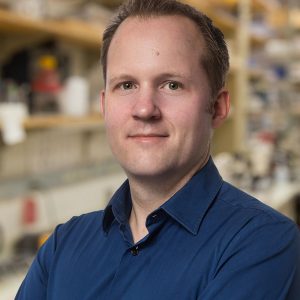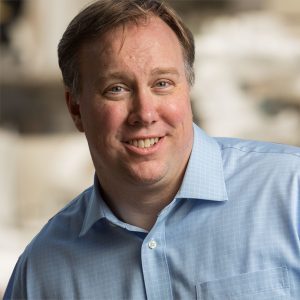
December 19, 2016
LA JOLLA—The Salk Institute is pleased to welcome Wolfgang Busch as an associate professor and Edward Stites as an assistant professor, leaders of plant science and cancer research, respectively.
“Salk’s mission to conduct groundbreaking research on some of humanity’s most critical environmental and disease-related issues will take a great leap forward with the addition of these two exceptional scientists,” says Salk President Elizabeth Blackburn. “Their expertise will advance Salk’s crucial work in plant biology—needed now more than ever in the face of climate change—as well as in the devastating disease of cancer.”

Click here for a high-resolution image
Credit: Salk Institute
Busch, whose appointment begins on March 31, 2017, joins the Institute as an associate professor in the Plant Molecular and Cellular Biology Laboratory. Busch uses a systems genetics approach—which combines techniques from genetics, genomics and other science fields—to understand how root growth in given environments is determined by a plant’s genes. Discoveries in this area could reveal critical insight into growing plants (and food) that can thrive in more extreme environments prompted by climate change, such as drought. He focuses mainly on Arabidopsis thaliana, a commonly studied weed that grows all over the world, to understand, model and predict the molecular and cellular mechanisms responsible for root growth.
Busch comes to Salk from the Gregor Mendel Institute of Molecular Plant Biology, where he was a group leader. He is a recipient of the Society for Experimental Biology President’s Medal, which is awarded to young scientists of outstanding merit. He earned his PhD summa cum laude from the University of Tubingen, in Germany.

Click here for a high-resolution image
Credit: Salk Institute
“What is really extraordinary about Salk is how much real communication goes on between scientists in different fields,” says Busch. “At many institutions that’s not the case, but this environment lets you step out of your own field and think about really big, fundamental questions. For example, as a plant biologist, being able to talk to neuroscientists about information processing, which both fields deal with, is very exciting.”
Also joining Salk’s faculty is Edward Stites, who will be an assistant professor in the Integrative Biology Laboratory in January 2017. He is a physician-scientist who studies key cellular proteins that usher signals into the cell nucleus from outside the cell, affecting gene expression. When such proteins are dysfunctional, they can trigger uncontrolled growth, which is one of the hallmarks of cancer. By using both traditional experimental techniques and computational ones, Stites aims to develop a new generation of precision therapies that can better target cancers.
“Salk has a history of fostering and nurturing creative, innovative approaches that enable people to make big advances,” says Stites. “This environment will let me maintain all the strengths of being a physician-scientist by connecting with the Salk and UC San Diego cancer centers to know where the biggest questions are, while at the same time being free to pursue my research.”
Prior to joining the Salk Institute, Stites was a clinical pathology resident in the Physician Scientist Training Program at Washington University in St. Louis, Mo. He received both his MD and PhD degrees from the University of Virginia in Charlottesville, obtaining his doctorate in biophysics as part of the Medical Scientist Training Program. His research was recognized with the University of Virginia’s Michael J. Peach award.
Office of Communications
Tel: (858) 453-4100
press@salk.edu
Unlocking the secrets of life itself is the driving force behind the Salk Institute. Our team of world-class, award-winning scientists pushes the boundaries of knowledge in areas such as neuroscience, cancer research, aging, immunobiology, plant biology, computational biology and more. Founded by Jonas Salk, developer of the first safe and effective polio vaccine, the Institute is an independent, nonprofit research organization and architectural landmark: small by choice, intimate by nature, and fearless in the face of any challenge.